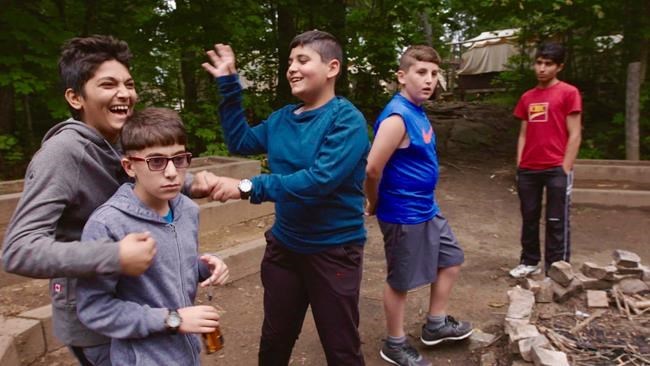
A scene from the Barbara Kopple-directed documentary “New Homeland,” which follows refugee boys at Camp Pathfinder in Algonquin Park is shown in a handout photo. THE CANADIAN PRESS/HO-Cabin Creek Films MANDATORY CREDIT
Republished April 02, 2019 - 12:48 PM
Original Publication Date April 02, 2019 - 10:06 AM
TORONTO - Oscar-winning director Barbara Kopple's latest documentary, "New Homeland," captures quintessentially Canadian childhood pleasures as teen boys swim in a lake, play dodgeball and portage with canoes at Camp Pathfinder in Algonquin Park.
But behind some of those smiling faces are harrowing stories.
Making its Canadian debut Wednesday, Thursday and Saturday at Hot Docs Ted Rogers Cinema in Toronto, "New Homeland" — from Cabin Creek Films in partnership with NowThis — begins with footage of decimated buildings and bombings in war-torn regions of Syria and Iraq from which some of the boys and their families fled.
It then follows the families' journeys as refugees in Canada in 2017, with sponsors who help them build new lives over a year-long period and send the children to the summer camp of boys and young men that has opened its arms to asylum seekers.
"This film comes at a time when the United States has been turning its back on its historic role as a welcomer of refugees in the world, and a time when the Canadians have historically really stepped in to fill those shoes," Kopple, who grew up in Scarsdale, N.Y., and lives south of the border, said in a recent phone interview.
"I just think that maybe the Canadians can serve to remind the Americans of what they've always stood for."
The director, who won an Oscar for her 1976 doc "Harlan County, U.S.A." and another for 1991's "American Dream," learned about Camp Pathfinder through producer Eric Forman. He grew up in Buffalo, N.Y., spent summers at the camp and heard it had started to accept Syrian and Iraqi refugee children as part of a sponsorship program about two years ago.
Featured in the film are the Zin family from Amuda, Syria; the Majeed family from Baghdad, Iraq; and the Darewish family from Aleppo, Syria. All three live in Toronto and are supported in the film by individuals through private sponsorship groups.
Cameras capture the families as they recall their difficult pasts and state their hopes for themselves and their children. The sponsors speak to why they wanted to help the families.
It's the first time the boys have been to camp and they learn a host of things they'd never done before, from counsellors who are patient and supportive, in a serene wilderness some of them have never known before.
"I think it gave them a real sense of confidence," said Kopple. "The biggest thing is, they made new friends and they overcame their fears."
For teen Omer Majeed, however, it's not an easy transition and he gets sent home early.
"He saw a lot of bad things," said Kopple. "Before they came to Canada he went to Turkey and I guess in Turkey he was afraid for his life.
"And his brother, when he was in Baghdad, saw a club blow up and saw people who had died. And also their father was taken from them. They think he was probably murdered, the father, who was a policeman in Baghdad."
Kopple said the families and sponsors from the film will attend some of the screenings in Toronto, as will some representatives from Camp Pathfinder. She'll also participate in a post-screening Q-and-A at all three showings.
"I wanted to really show who they are as people and what you can do. For me, a refugee is someone who leaves their home but not by choice; it's for their wellbeing," said Kopple.
The film serves as a reminder "to help each other and to ask ourselves how to deal in the role of helping refugees," she added.
"If anything, the takeaway for me in this project is: If our governments won't act, what can each of us do to fill this vacuum?"
Note to readers: This is a corrected story. A previous version said Eric Forman grew up in Rochester.
News from © The Canadian Press, 2019